-
ORIGINAL ARTICLE01-10-2024
Micro and macropolitical determinants for non-vaccination against COVID-19 in pregnant women in Belo Horizonte
Revista Brasileira de Enfermagem. 2024;77:e20230235
Abstract
ORIGINAL ARTICLEMicro and macropolitical determinants for non-vaccination against COVID-19 in pregnant women in Belo Horizonte
Revista Brasileira de Enfermagem. 2024;77:e20230235
DOI 10.1590/0034-7167-2023-0235
Views0See moreABSTRACT
Objective:
To analyze the determinants for non-vaccination against COVID-19 in pregnant women in Belo Horizonte, Minas Gerais, Brazil.
Methods:
An epidemiological study with a cross-sectional design was conducted using data from the project titled “Childbirth and Breastfeeding in Children of Mothers Infected by SARS-CoV-2,” developed during the pandemic in the city of Belo Horizonte, Minas Gerais, Brazil.
Results:
The study sample consisted of 360 pregnant women, of whom 77.89% received the COVID-19 vaccine. External, social, and institutional determinants can influence lower adherence to COVID-19 vaccination, especially the absence of employment during pregnancy, difficult access to prenatal consultations, and a compromised or deficient support network.
Conclusions:
In light of this scenario, greater encouragement for health education is necessary, especially during prenatal care, resulting in lower rates of morbidity and mortality and favorable perinatal outcomes.
-
ORIGINAL ARTICLE01-10-2024
COVID-19: Training activities, adherence, and use of personal protective equipment in Primary Health Care
Revista Brasileira de Enfermagem. 2024;77:e20230179
Abstract
ORIGINAL ARTICLECOVID-19: Training activities, adherence, and use of personal protective equipment in Primary Health Care
Revista Brasileira de Enfermagem. 2024;77:e20230179
DOI 10.1590/0034-7167-2023-0179
Views0See moreABSTRACT
Objective:
to analyze the association between participation in training activities and the adherence to and use of personal protective equipment by workers and professionals involved in Health Residency Programs in Primary Health Care during the COVID-19 pandemic.
Methods:
a cross-sectional study in Brazil between August/2020 and March/2021. We utilized the EPI-APS COVID-19 instrument and its adapted version for resident professionals.
Results:
455 PHC workers and 102 residents participated in the study. Among them, 54.5% and 55.9%, respectively, engaged in training activities. We observed an association between participation in training activities and the proper use of gloves (p<0.001), gowns (p=0.009), goggles/face shields (p=0.002), and overall adherence (p<0.001) among PHC workers, and the proper use of surgical masks (p=0.028) among residents. Adherence rates of ≥75% were identified in 6.9% of PHC workers and none among the residents.
Conclusion:
training activities are associated with increased adherence to and proper use of PPE.
-
ORIGINAL ARTICLE12-16-2024
Software for the care of people with cardiovascular risk: construction and evidence of validity
Revista Brasileira de Enfermagem. 2024;77(6):e20240276
Abstract
ORIGINAL ARTICLESoftware for the care of people with cardiovascular risk: construction and evidence of validity
Revista Brasileira de Enfermagem. 2024;77(6):e20240276
DOI 10.1590/0034-7167-2024-0276
Views0See moreABSTRACT
Objectives:
to build and validate software for the care of people with cardiovascular risk.
Methods:
a methodological study, applied to software development, anchored in a nursing theory and classification system, in three stages: 1) requirements engineering; 2) software architecture and coding; and 3) testing and content validity by 12 experts in computer science, with a Content Validity Ratio score.
Results:
called e-TEORISC, in software format, for nursing care for people with cardiovascular risk, online and offline, containing a database linked to the Nursing Process stages. Experts considered that the attributes of functional suitability, performance efficiency, reliability, maintainability, usability, safety and portability obtained desirable scores.
Conclusions:
e-TEORISC has evidence of validity to instrumentalize care for people at cardiovascular risk, with potential for technology transfer to the Brazilian Health System.

-
ORIGINAL ARTICLE12-16-2024
Sleep quality of patients with heart failure and associated factors
Revista Brasileira de Enfermagem. 2024;77(6):e20240244
Abstract
ORIGINAL ARTICLESleep quality of patients with heart failure and associated factors
Revista Brasileira de Enfermagem. 2024;77(6):e20240244
DOI 10.1590/0034-7167-2024-0244
Views0See moreABSTRACT
Objectives:
to assess sleep quality of patients with heart failure and associated sociodemographic and clinical characteristics.
Methods:
a cross-sectional study, developed with 88 patients. Sleep quality was assessed by the Pittsburgh Sleep Quality Index. The data were analyzed using descriptive and inferential statistics.
Results:
the mean sleep quality score was 8.59 ± 3.60 points. 83% of participants were classified as poor sleepers. The number of hours of sleep was 5.99 ± 1.48. Family income of up to one minimum wage and functional class were significantly associated with poor sleepers. There was a positive correlation between functional class and poor sleep quality.
Conclusions:
a high frequency of poor sleepers was identified. Worse scores were associated with family income and symptomatic functional class. Health interventions are necessary to control sleep quality, especially in relation to health functionality.
-
12-16-2024
Religión y experiencia profesional: ¿Serán predictores de la inteligencia espiritual de los enfermeros? Estudio transversal
Revista Brasileira de Enfermagem. 2024;77(6):e20240217
Abstract
Religión y experiencia profesional: ¿Serán predictores de la inteligencia espiritual de los enfermeros? Estudio transversal
Revista Brasileira de Enfermagem. 2024;77(6):e20240217
DOI 10.1590/0034-7167-2024-0217es
Views1See moreRESUMEN
Objetivos:
analizar la relación entre religión y experiencia profesional con la inteligencia espiritual en enfermeros.
Métodos:
estudio transversal y analítico realizado en 2021, participaron 544 profesionales de enfermería que laboraban en establecimiento de salud de Perú durante la pandemia por COVID-19. Para el análisis de los datos se emplearon el análisis de regresión múltiple y correlación de Pearson.
Resultados:
en los enfermeros predominó un nivel de inteligencia espiritual saludable (42,8%). Quienes no profesaban una religión tenían mayor probabilidad de tener menor puntaje de inteligencia espiritual (escala global y dimensiones); sin embargo, los enfermeros expertos tuvieron mayor probabilidad de tener mayor inteligencia espiritual (escala global y dimensiones) que los enfermeros novatos (p<0,05).
Conclusiones:
la inteligencia espiritual en los enfermeros fue predicha por la religión y la experiencia profesional. Este hallazgo sugiere que la inteligencia espiritual en enfermería se consolida mediante prácticas religiosas y durante el ejercicio profesional.
-
ORIGINAL ARTICLE12-16-2024
Religion and professional experience: Are they predictors of nurses’ spiritual intelligence? Cross-sectional study
Revista Brasileira de Enfermagem. 2024;77(6):e20240217
Abstract
ORIGINAL ARTICLEReligion and professional experience: Are they predictors of nurses’ spiritual intelligence? Cross-sectional study
Revista Brasileira de Enfermagem. 2024;77(6):e20240217
DOI 10.1590/0034-7167-2024-0217
Views0See moreABSTRACT
Objectives:
to analyze the relationship between religion and professional experience with spiritual intelligence in nurses
Methods:
cross-sectional and analytical study carried out in 2021, with the participation of 544 nursing professionals working in health facilities in Peru during the COVID-19 pandemic. Multiple regression analysis and Pearson’s correlation were used to analyze the data.
Results:
in nurses, a healthy level of spiritual intelligence predominated (42.8%). Those who did not profess a religion were more likely to have a lower spiritual intelligence score (global scale and dimensions); however, experienced nurses were more likely to have higher spiritual intelligence (global scale and dimensions) than novice nurses (p<0.05).
Conclusions:
spiritual intelligence in nurses was predicted by religion and professional experience. This finding suggests that spiritual intelligence in nursing is consolidated through religious practices and during professional practice.
-
ORIGINAL ARTICLE12-16-2024
Effectiveness of the modified Seldinger technique for peripheral central catheter in newborns: a randomized clinical trial
Revista Brasileira de Enfermagem. 2024;77(6):e20240189
Abstract
ORIGINAL ARTICLEEffectiveness of the modified Seldinger technique for peripheral central catheter in newborns: a randomized clinical trial
Revista Brasileira de Enfermagem. 2024;77(6):e20240189
DOI 10.1590/0034-7167-2024-0189
Views0See moreABSTRACT
Objectives:
to evaluate the effectiveness of peripheral central catheterization by comparing the modified Seldinger technique and the conventional technique in critically ill newborns.
Methods:
randomized unmasked clinical trial conducted in a public children’s hospital. Participation of 111 newborns with randomized allocation, 56 in the control group (conventional technique) and 55 in the experimental group (modified Seldinger). Success and absence of complications were evaluated as primary outcomes. The pain scale, difficulty in hemostasis, procedure time and number of punctures were considered secondary outcomes.
Results:
there was no statistical significance between groups, either for success (p=0.705) or absence of complications (p=0.347). A lower pain score, improved hemostasis, increased assertiveness with fewer punctures and reduced procedure time were not observed in the experimental group.
Conclusions:
the modified Seldinger technique did not prove to be a more effective insertion technology compared to the conventional method. Brazilian Clinical Trial Registry: RBR-69vks36.

-
ORIGINAL ARTICLE12-16-2024
Narratives of sex workers: intimate partner violence and coping strategies
Revista Brasileira de Enfermagem. 2024;77(6):e20240180
Abstract
ORIGINAL ARTICLENarratives of sex workers: intimate partner violence and coping strategies
Revista Brasileira de Enfermagem. 2024;77(6):e20240180
DOI 10.1590/0034-7167-2024-0180
Views0See moreABSTRACT
Objectives:
to understand the narratives of sex workers about violence suffered by intimate partners and their coping strategies.
Methods:
qualitative research, focused on thematic oral history, carried out with six sex workers in southern Brazil, who responded to in-depth interviews using a flexible script. Thematic content analysis was used.
Results:
the study included cisgender women who self-identified as half black and half white. Most had children and were separated. They reported abusive relationships by their intimate partners, with emphasis on verbal, psychological, financial, and physical violence and attempted femicide. Such violence resulted in coping strategies, such as avoiding emotional bonds and maintaining a discreet life.
Final Considerations:
intimate partner violence is prevalent among participants, leading them to adopt strategies to preserve their safety and well-being, highlighting the need for public policies that meet their particularities and guarantee protection.
-
08-19-2024
Abuso sexual, aborto e saúde pública no brasil: quando o julgamento moral acentua as iniquidades
Revista Brasileira de Enfermagem. 2024;77:e77suppl0401
Abstract
Abuso sexual, aborto e saúde pública no brasil: quando o julgamento moral acentua as iniquidades
Revista Brasileira de Enfermagem. 2024;77:e77suppl0401
DOI 10.1590/0034-7167.202477suppl0401pt
Views0Eis aqui um editorial acadêmico-político que tem como objetivo convocar o campo científico a refletir sobre os perigos das decisões relativas ao direito ao aborto sob réguas morais, uma vez que não há evidências de que tal perspectiva se traduza em práticas de cuidado, proteção à infância e equidade de gênero – elementos tão urgentes […]See more -
ORIGINAL ARTICLE08-19-2024
The use of individual tracking programs in public health: a bioethics dilemma
Revista Brasileira de Enfermagem. 2024;77:e20230041
Abstract
ORIGINAL ARTICLEThe use of individual tracking programs in public health: a bioethics dilemma
Revista Brasileira de Enfermagem. 2024;77:e20230041
DOI 10.1590/0034-7167-2023-0041
Views0See moreABSTRACT
Objective:
to understand the bioethical perspectives on mobile tracking device use.
Methods:
theoretical study based on action research, carried out with eight graduate students from a public university. A focus group was used, with a thematic content analysis methodology with a codebook structure, approved by the Research Ethics Committee.
Results:
from the analysis, there was a concern about using devices after the pandemic ended. Using or not the device, rights inherent to humans, legislation and effectiveness of methods deepen interpretations, moving participants from a personalistic conception of the topic to a vision focused on professional implications about the methods.
Final considerations:
the debate on the impact of using technological devices on health, especially those that imply restriction of rights that refer to individuals’ private life, involves a discussion of a professional nature, in addition to requirement for clear rules on the topic.
-
ORIGINAL ARTICLE08-19-2024
Bioethical issues in the family health strategy: Considerations for nursing care management
Revista Brasileira de Enfermagem. 2024;77:e20220818
Abstract
ORIGINAL ARTICLEBioethical issues in the family health strategy: Considerations for nursing care management
Revista Brasileira de Enfermagem. 2024;77:e20220818
DOI 10.1590/0034-7167-2022-0818
Views0See moreABSTRACT
Objective:
To understand the bioethical issues involved in the care management of nurses working in the Family Health Strategy.
Method:
A qualitative study was conducted through five focus groups with 36 nurses selected in the sample. Thematic content analysis was performed based on the bioethical framework, and the synthesis was presented in a conceptual map.
Results:
Bioethical issues were identified in the nursing care practice, related to both specific bioethical themes and the peculiarities of the work. Additionally, challenges and facilitators that interfere with addressing these issues were identified.
Final considerations:
Understanding the bioethical issues involved in the care management of nurses was possible with the theoretical support of different bioethical perspectives. The identified issues relate to persistent and current themes in the field of bioethics. However, some aspects intrinsic to daily practice are still imperceptible to professionals, contributing to the difficulty of discussing bioethics in this care model.

-
REVIEW07-29-2024
Telenursing in the postoperative period: a scoping review
Revista Brasileira de Enfermagem. 2024;77(3):e20240066
Abstract
REVIEWTelenursing in the postoperative period: a scoping review
Revista Brasileira de Enfermagem. 2024;77(3):e20240066
DOI 10.1590/0034-7167-2024-0066
Views0See moreABSTRACT
Objectives:
to map available evidence on telenursing use in the postoperative period and its impact on patient outcomes.
Methods:
a scoping review, conducted according to the JBI model and the PRISMA-ScR checklist. The search was carried out in the CINAHL, Embase, LILACS, PubMed, Web of Science, SciELO, Scopus and Cochrane Library databases.
Results:
twelve studies were included, published between 2011 and 2023, 66.6% of which were in developed countries. Of the positive outcomes, we highlight improved levels of disability, autonomy and quality of life, lower rates of post-operative complications, pain and reduced costs. Telephone monitoring was the most widely used modality, but there were few studies in the pediatric context and in Brazil.
Conclusions:
of the studies, 11 (91.6%) identified at least one positive outcome in telenursing use and none showed negative aspects in the postoperative period. The role of nurses in digital health needs further study.

-
ORIGINAL ARTICLE07-29-2024
Men’s perception of paternal parenthood and the promotion of child development
Revista Brasileira de Enfermagem. 2024;77(3):e20230514
Abstract
ORIGINAL ARTICLEMen’s perception of paternal parenthood and the promotion of child development
Revista Brasileira de Enfermagem. 2024;77(3):e20230514
DOI 10.1590/0034-7167-2023-0514
Views0See moreABSTRACT
Objectives:
to comprehend men’s perception of paternal parenthood while caring for infants to promote child development.
Methods:
this qualitative study adopts an exploratory approach and was conducted with undergraduate and graduate students, faculty, and staff who are fathers of infants up to 6 months old from a higher education institution, excluding fathers from mononuclear families. Data collection occurred through semi-structured interviews and was analyzed using thematic categorical analysis.
Results:
fifteen men participated in the study. From the analysis, two empirical categories emerged: “Perception of being a father: challenges and novelties” and “Promotion of child development: actions carried out by fathers”. Fathers revealed feeling unprepared, the need for emotional support, and recognized activities aimed at their children’s development.
Final Considerations:
the relevance of the paternal figure for child development is highlighted, as well as the need for public policies to encourage paternal parenthood.
-
ORIGINAL ARTICLE07-29-2024
Contribution of informal caregivers to self-care in individuals with heart failure
Revista Brasileira de Enfermagem. 2024;77(3):e20230492
Abstract
ORIGINAL ARTICLEContribution of informal caregivers to self-care in individuals with heart failure
Revista Brasileira de Enfermagem. 2024;77(3):e20230492
DOI 10.1590/0034-7167-2023-0492
Views0See moreABSTRACT
Objectives:
to evaluate the contribution of informal caregivers to the self-care of individuals with heart failure.
Methods:
a cross-sectional study was conducted with 87 caregivers from March to October 2022 in the city of João Pessoa/PB. The caregivers’ contribution was assessed using the Caregiver Contribution to Self-Care of Heart Failure Index instrument. Scores ≥ 70 points indicate adequate contribution. Data were analyzed using descriptive statistics and Spearman’s correlation.
Results:
the sample consisted of 81.6% female caregivers. Median scores obtained for the self-care contribution scales were: 63.3 for maintenance; 55.5 for management; and 66.6 for confidence. Caregivers never or rarely recommended monitoring body weight, regular physical exercise, extra use of diuretics, and fluid restriction.
Conclusions:
informal caregivers showed inadequate contribution in the areas of maintenance, management, and confidence in self-care of individuals with heart failure.
-
07-29-2024
Reflections on theoretical framework use in nursing research
Revista Brasileira de Enfermagem. 2024;77(3):e20230486
Abstract
Reflections on theoretical framework use in nursing research
Revista Brasileira de Enfermagem. 2024;77(3):e20230486
DOI 10.1590/0034-7167-2024-0486
Views0See moreABSTRACT
Objectives:
to reflect on theoretical framework use in nursing research.
Methods:
a theoretical-reflexive study, based on concepts and constructs pertinent to using nursing theories and other sciences, considering issues of epistemology or philosophy of science.
Results:
we presented what it is and why to do nursing research and what a theoretical framework is and why to use it, in addition to some considerations regarding theoretical framework use in nursing research, essential for constructing disciplinary knowledge, which enables the materialization of researchers’ work and the presentation of propositions resulting from investigations in and for nursing as a discipline and science.
Final Considerations:
based on a reflection based on epistemological conceptions, it is possible to affirm that a theoretical framework is the core of researchers’ thinking, delimiting a problem to be investigated and, based on it, outlining methodological strategies to be followed, supporting nursing action and thinking as discipline and science.

-
REVIEW07-29-2024
Nursing diagnoses for people hospitalized with heart failure: an integrative review
Revista Brasileira de Enfermagem. 2024;77(3):e20230471
Abstract
REVIEWNursing diagnoses for people hospitalized with heart failure: an integrative review
Revista Brasileira de Enfermagem. 2024;77(3):e20230471
DOI 10.1590/0034-7167-2023-0471
Views0See moreABSTRACT
Objectives:
to identify in the literature the main nursing diagnoses according to the NANDA-I diagnostic classification for people hospitalized with heart failure.
Methods:
an integrative literature review, carried out in February 2019 and updated in July 2023, in the MEDLINE via PubMed, LILACS, SciELO and CINAHL databases. Given the use of acronym PEO, studies without a time cut in Portuguese, English and Spanish were included. Descriptive analysis was carried out to present the identified information.
Results:
analysis of 27 articles identified 24 nursing diagnoses, with emphasis on Decreased Cardiac Output, Excessive Fluid Volume, Decreased Activity Tolerance and Fatigue.
Final Considerations:
evidence can contribute to better diagnostic decisions centered on people with heart failure in search of more assertive health results and have the potential to support future studies on a possible syndromic pattern in this population.

-
ORIGINAL ARTICLE10-17-2022
Supervision of the professional practice of nursing: case study describing the “on-site inspection” sub-process
Revista Brasileira de Enfermagem. 2022;75(2):e20210823
Abstract
ORIGINAL ARTICLESupervision of the professional practice of nursing: case study describing the “on-site inspection” sub-process
Revista Brasileira de Enfermagem. 2022;75(2):e20210823
DOI 10.1590/0034-7167-2021-0823
Views0See moreABSTRACT
Objectives:
to describe the “On-site inspection” sub-process of the macroprocess “Supervision” conducted at the headquarters unit of the Regional Nursing Council of São Paulo.
Methods:
an exploratory descriptive research, in a single case study modality using data reported by the Headquarters Unit Inspection Management leaders.
Results:
the description of the “On-Site inspection” sub-process, initial and return, showed how the activities/tasks pre-established in the inspection roadmap and inserted in the respective inspection terms need to be accurately and sequentially executed to comply with the current legislation and provided the identification of activities that add value to the inspection process.
Conclusions:
the results obtained give visibility to the activities/tasks developed by the inspectors and will provide the Inspection Management with subsidies for the rational allocation of the required human resources; and, to the technical managers and legal representatives of the inspected institutions, the knowledge of the activities developed during the performance of the sub-process “On-site inspection”.
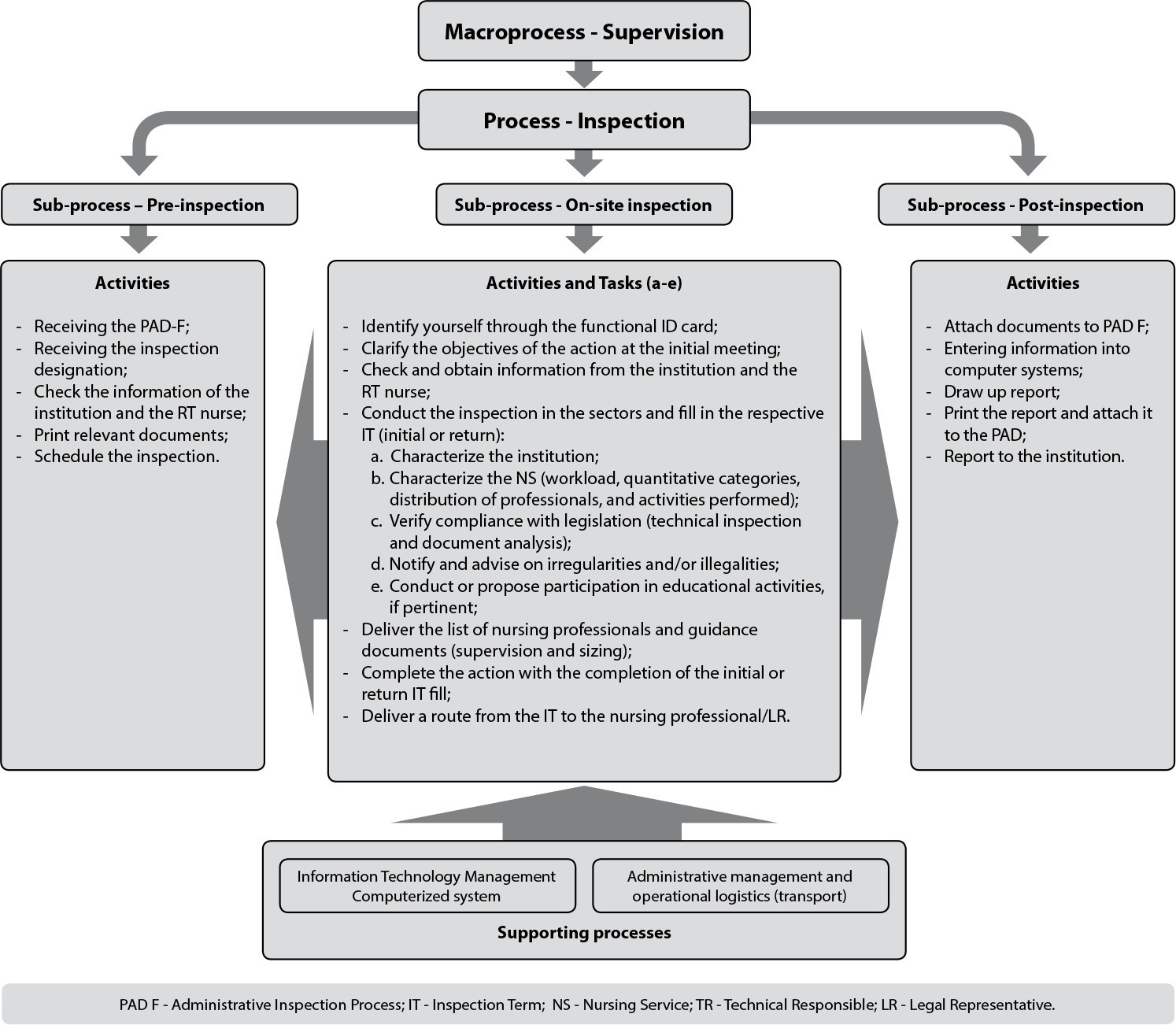
-
REVIEW10-17-2022
Authentic leadership in nurses’ professional practice: an integrative review
Revista Brasileira de Enfermagem. 2022;75(1):e20210972
Abstract
REVIEWAuthentic leadership in nurses’ professional practice: an integrative review
Revista Brasileira de Enfermagem. 2022;75(1):e20210972
DOI 10.1590/0034-7167-2021-0972
Views0See moreABSTRACT
Objectives:
to identify the primary constructs concerning authentic leadership and its relevance for nurses’ professional practice.
Methods:
integrative literature review conducted between 2015 and 2020 in LILACS, SciELO, and PubMed databases.
Results:
the United States published most of the 31 studies analyzed, with eight studies (25.8%), followed by Canada with seven studies (22.6%), and Brasil with five (16.1%). Most studies adopted a quantitative approach (77.41%), and 96.8% presented weak evidence. Three categories emerged: Work Engagement/Job Satisfaction and Organizational Commitment; Healthy Work Environment; and Intention to Quit the Job and Mental Exhaustion.
Final Considerations:
authentic leadership positively contributes to management and nursing care practice, promoting healthy work environments, structural empowerment, greater work engagement, and organizational commitment, decreasing absenteeism and mental exhaustion.
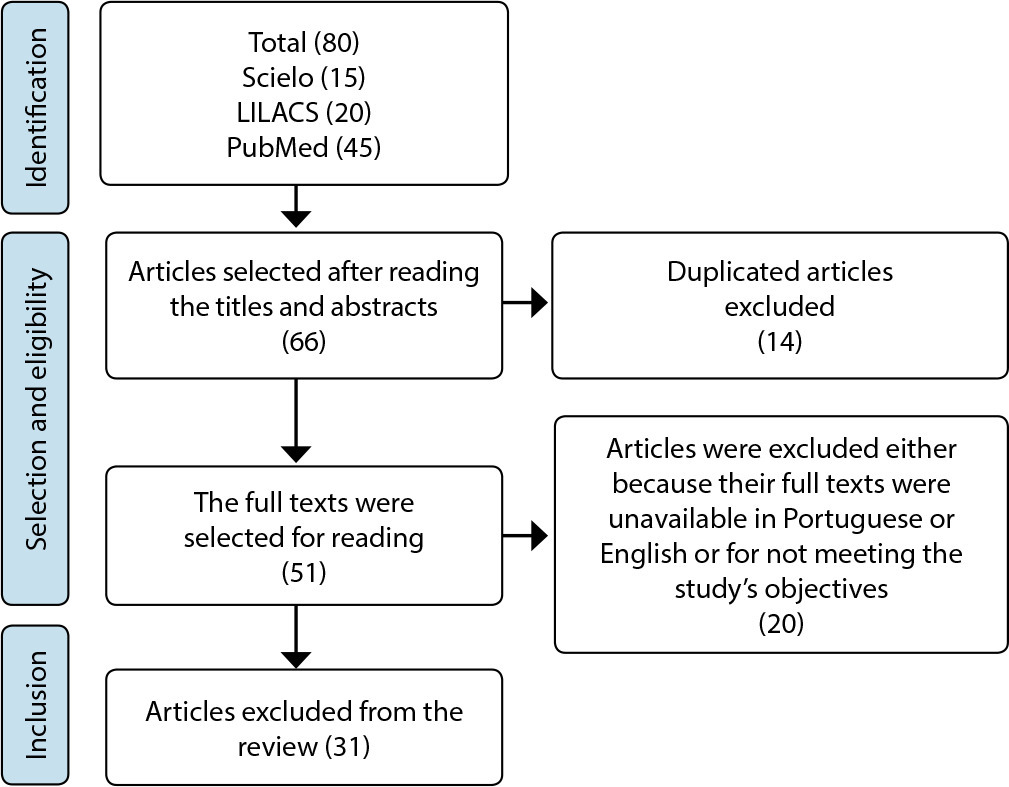
-
REVIEW10-07-2022
Strategies for thirst management in postoperative adult patients: a scoping review
Revista Brasileira de Enfermagem. 2022;75(4):e20220154
Abstract
REVIEWStrategies for thirst management in postoperative adult patients: a scoping review
Revista Brasileira de Enfermagem. 2022;75(4):e20220154
DOI 10.1590/0034-7167-2022-0154
Views0See moreABSTRACT
Objectives:
to map the strategies for managing thirst in postoperative adult patients.
Methods:
scoping review was conducted in October 2021 in 19 data sources: 14 databases and 5 platforms to search in the grey literature. It was prepared according to the recommendations of the Joanna Briggs Institute and the checklist of the Preferred Reporting Items for Systematic reviews and Meta-Analyses extension for Scoping Reviews. Nine selected articles were part of the final sample.
Results:
there is evidence of strategies to manage postoperative thirst using interventions such as water, ice, mentholated measures, carbohydrate and protein enriched fluid, oral hydrator, flavored gargling, cold gargling, wet gauze, 0.75% citric acid spray, and cold water.
Final Considerations:
the strategies observed may be reduced to cold and menthol use, salivary stimulants, and early introduction of fluids. The outcomes were positive in all the studies reviewed.
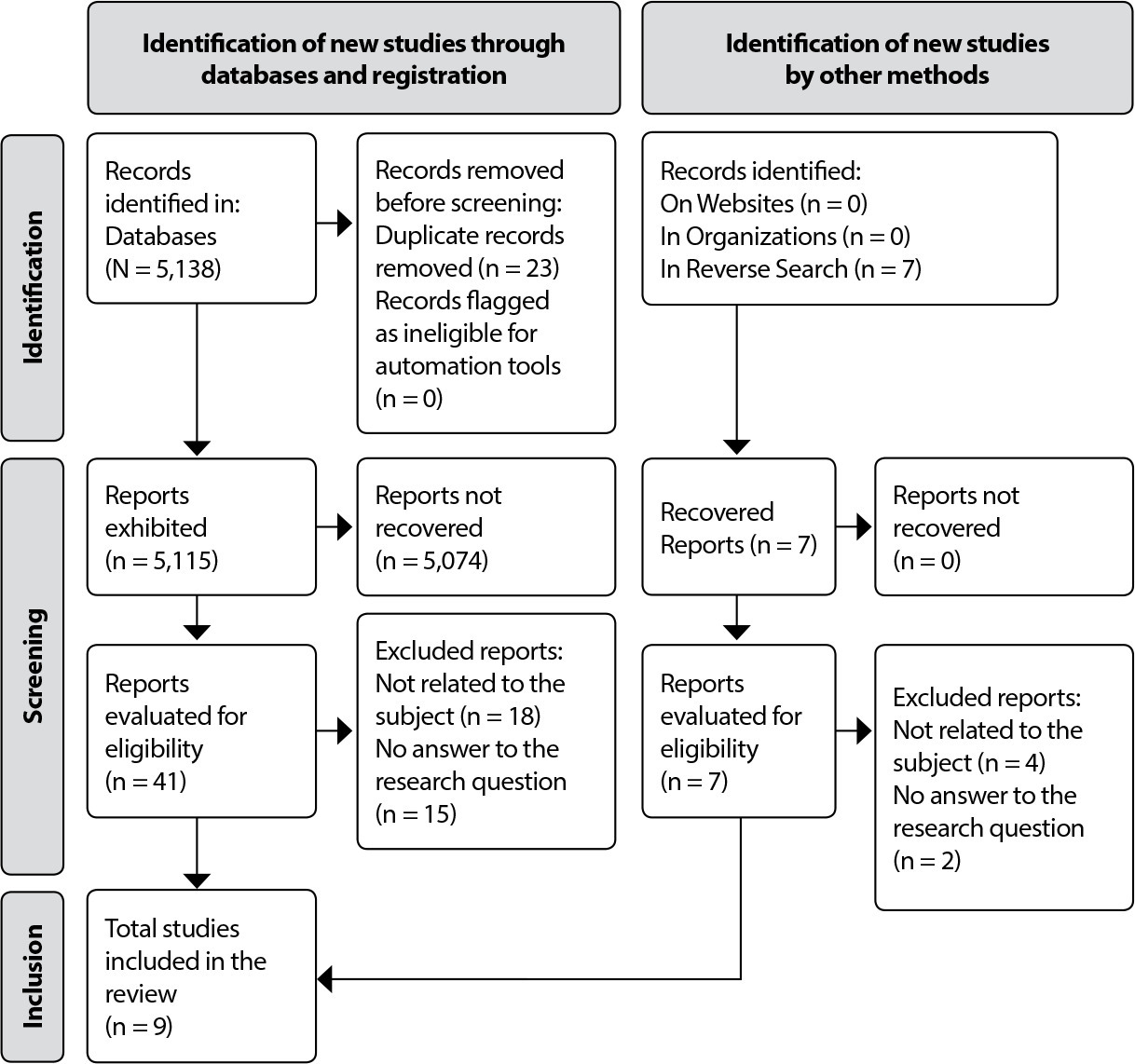
-
ORIGINAL ARTICLE10-07-2022
Perception of men perpetrators of violence about paternity
Revista Brasileira de Enfermagem. 2022;75(4):e20210890
Abstract
ORIGINAL ARTICLEPerception of men perpetrators of violence about paternity
Revista Brasileira de Enfermagem. 2022;75(4):e20210890
DOI 10.1590/0034-7167-2021-0890
Views0See moreABSTRACT
Objectives:
to learn about the perception of men in the judicial process due to spousal violence about paternity.
Methods:
a descriptive, qualitative study with nine men in the judicial process due to spousal violence. Data were collected through interviews; the men validated the data, which were systematized by the categorical thematic content analysis, and analyzed in light of scientific texts that discuss the subject.
Results:
the study allowed the creation of three categories: the father is the example for the son; the father must provide for the son’s needs; the father corrects the son.
Conclusions:
that context reveals the need to re-signify paternity to influence children’s education positively.
-
ORIGINAL ARTICLE10-07-2022
Construction and validation of a serial album for companions of patients with stroke
Revista Brasileira de Enfermagem. 2022;75(4):e20210843
Abstract
ORIGINAL ARTICLEConstruction and validation of a serial album for companions of patients with stroke
Revista Brasileira de Enfermagem. 2022;75(4):e20210843
DOI 10.1590/0034-7167-2021-0843
Views0See moreABSTRACT
Objectives:
to construct and validate a serial album, to be used in hospital discharge planning of patients with stroke.
Methods:
a methodological study, with construction of a serial album, validity by 22 judges and assessment by 22 companions. Data were collected from the Health Education Content Validity Instrument, with the companions, from the Suitability Assessment of Materials.
Results:
the serial album has 21 pages. The overall Content Validity Index was equal to 0.87 among expert judges and 1.0 among companions.
Conclusions:
the educational technology constructed was considered valid by the judges and assessed as understandable by the companions so that it presented itself as a viable technological resource for use in the health education of companions of patients with stroke.
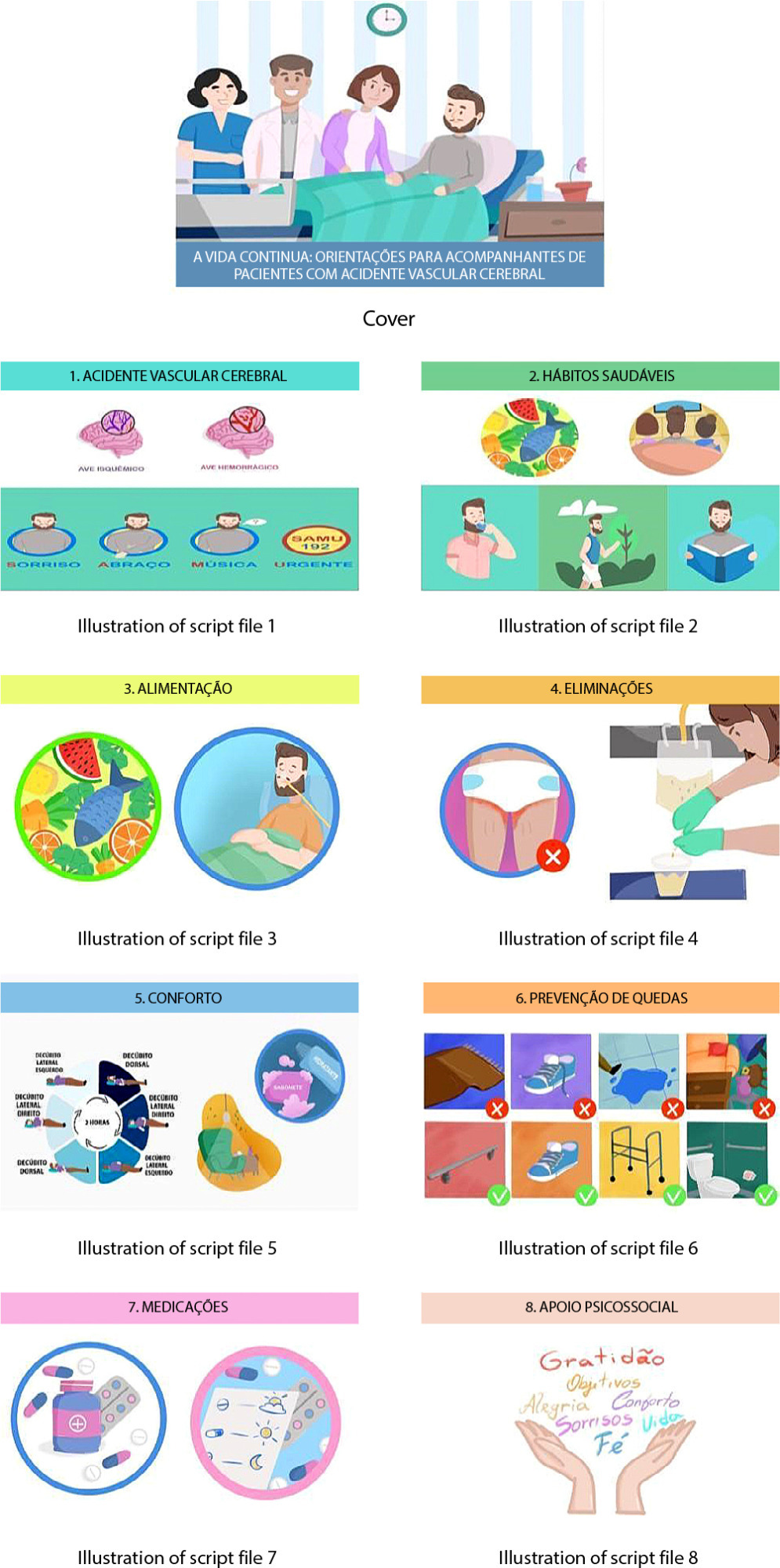
-
ORIGINAL ARTICLE10-07-2022
Violence against nursing workers: repercussions on patient access and safety
Revista Brasileira de Enfermagem. 2022;75(4):e20210765
Abstract
ORIGINAL ARTICLEViolence against nursing workers: repercussions on patient access and safety
Revista Brasileira de Enfermagem. 2022;75(4):e20210765
DOI 10.1590/0034-7167-2021-0765
Views1See moreABSTRACT
Objectives:
to analyze the repercussions of violence against nursing professionals, in the access and safety of patients in Family Health Strategy.
Methods:
a mixed study, with 169 nursing professionals. We used a socio-labor questionnaire, Survey Questionnaire Workplace Violence in the Health Sector, a patient safety instrument and interviews.
Results:
verbal aggression was related to support (p=0.048), respect (p=0.021), hours of care (p=0.047) and patient safety behaviors (p=0.033) among professionals. Suffering from bullying was related to fear of questioning when something is wrong (p=0.010) and lack of support from management (p=0.016). Victims of physical violence felt that their mistakes could be used against them. Mixed data converge and confirm that violence affects professional behavior and puts Primary Health Care attributes at risk.
Conclusions:
violence affects workers’ behavior, interferes with the care provided, weakens the access and safety of patients.
-
ORIGINAL ARTICLE10-07-2022
Nursing workload associated with neonatal mortality risk: a cross-sectional study
Revista Brasileira de Enfermagem. 2022;75(4):e20200965
Abstract
ORIGINAL ARTICLENursing workload associated with neonatal mortality risk: a cross-sectional study
Revista Brasileira de Enfermagem. 2022;75(4):e20200965
DOI 10.1590/0034-7167-2020-0965
Views0See moreABSTRACT
Objectives:
to analyze the association between nursing workload and neonatal mortality risk in newborns admitted to the Neonatal Intensive Care Unit.
Methods:
this is an observational, cross-sectional study conducted from January 2019 to January 2020.
Results:
the sample consisted of 399 newborns, 55.4% male, Nursing Activities Score mean of 67.5%, and Score for Neonatal Acute Physiology Perinatal Extension mean of 17.7, revealed itself as a predictor of the risk of death, while gestational age, length of hospitalization, and the first-minute Apgar established a protective relationship. The correlation between workload and neonatal mortality was low (r= 0.23, p=0.0009).
Conclusions:
the workload of the nursing team is not associated with the risk of mortality in the Neonatal Intensive Care Unit, as measured by the Nursing Activities Score.
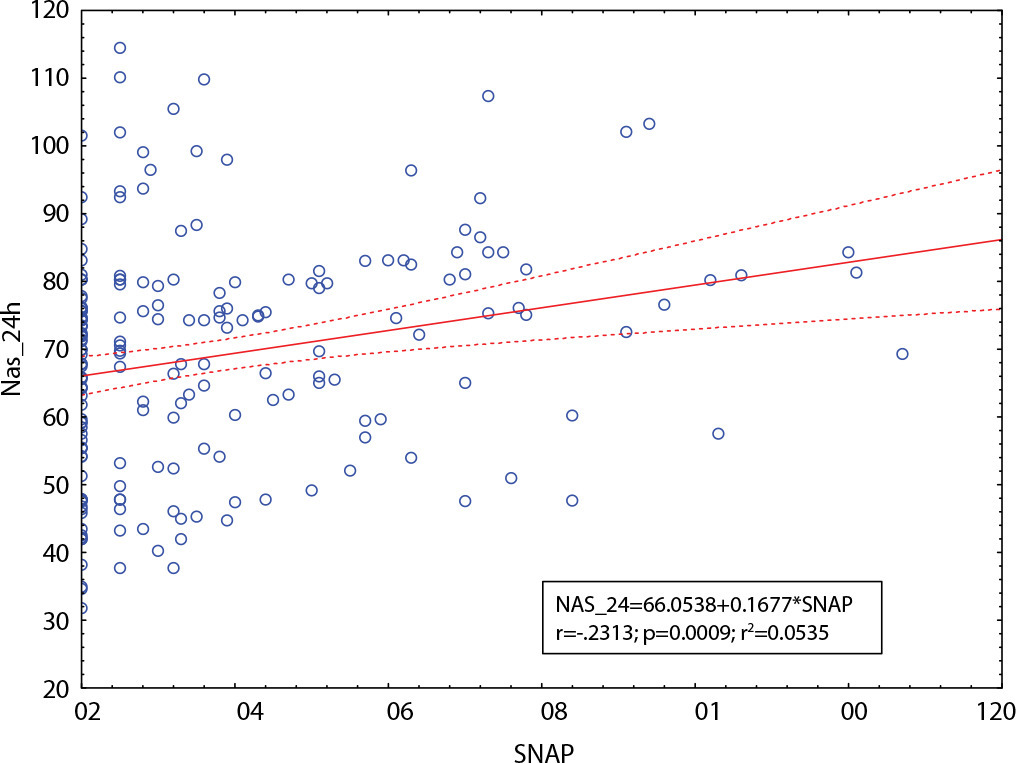
-
REVIEW10-03-2022
Intravenous therapy device labeling in Intensive Care Units: an integrative review
Revista Brasileira de Enfermagem. 2022;75(6):e20220049
Abstract
REVIEWIntravenous therapy device labeling in Intensive Care Units: an integrative review
Revista Brasileira de Enfermagem. 2022;75(6):e20220049
DOI 10.1590/0034-7167-2022-0049
Views0See moreABSTRACT
Objectives:
to synthesize the evidence on intravenous device labeling used to identify medications administered to patients in Intensive Care Units, with a view to preventing medication errors.
Methods:
an integrative review, in the LILACS, IBECS, Embase, MEDLINE, Scopus, Web of Science and CINAHL databases, from November to December 2021, using descriptors and selection criteria. Data were collected in 11 articles and subsequently classified, summarized and aggregated.
Results:
pre-designed labels, with pre-defined colors and information, help to prevent medication identification errors. There is still a lack of standardization in the practice of labeling syringes, intravenous lines, infusion pumps and saline solution bags. There are errors related to the lack of labeling devices or to their performance with incomplete information.
Conclusions:
device labeling is a barrier to defending the medication system safety and should be standardized.
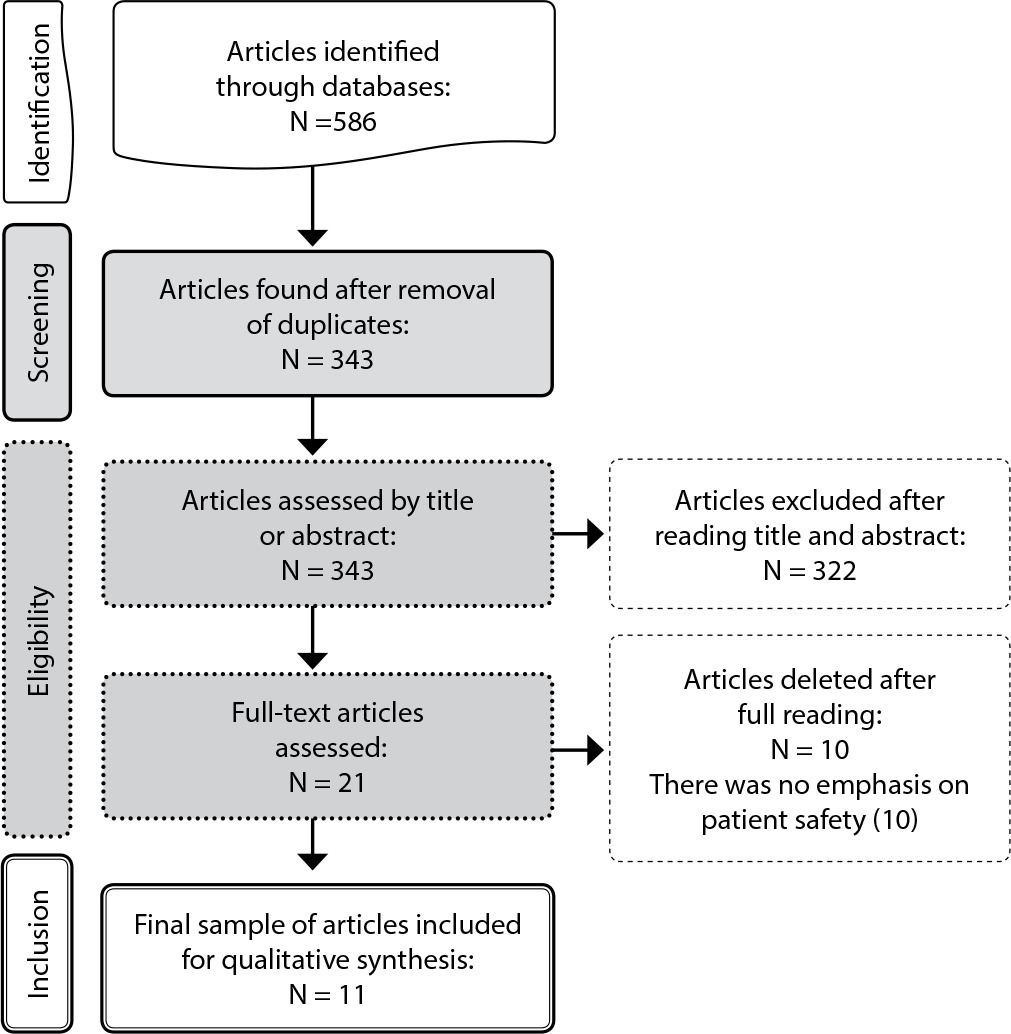
Search
Search in:
Nuvem de Tags
Adolescente (85) Atenção Primária à Saúde (239) COVID-19 (91) Criança (91) Cuidados de Enfermagem (269) Educação em Enfermagem (151) Educação em Saúde (139) Enfermagem (930) Enfermagem Pediátrica (86) Estudantes de Enfermagem (77) Estudos de Validação (131) Família (87) Idoso (208) Promoção da Saúde (99) Qualidade de Vida (104) Saúde do Trabalhador (86) Saúde Mental (145) Saúde Pública (82) Segurança do Paciente (150) Tecnologia Educacional (100)



